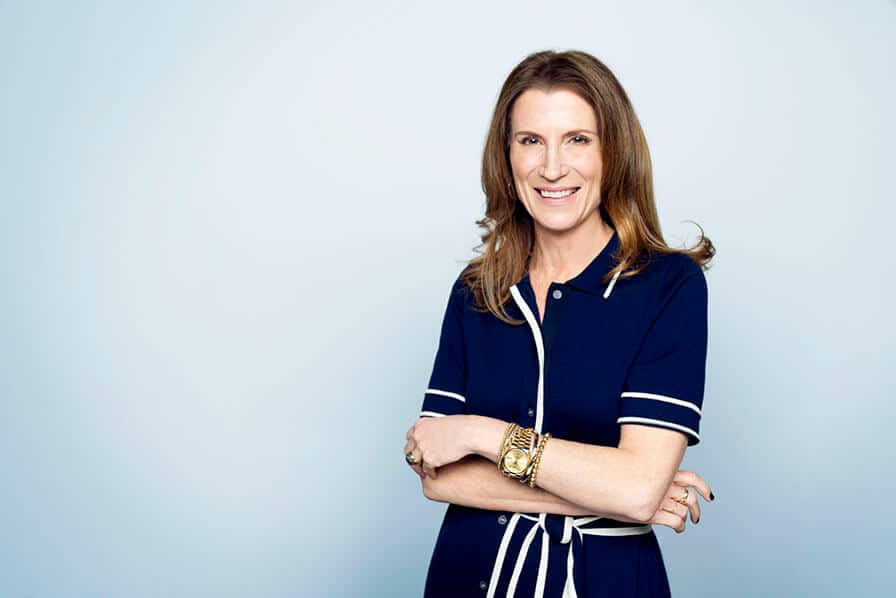A Bold Move
Dewey has a history of cultivating woman power. She was part of a powerful statement two years ago, when she and two other female Hollywood executives decided that all the presenters at the Screen Actors Guild Awards would be women.
“It was shortly after the Weinstein situation,” says Dewey. “That whole incident with him was the spark that started this forest fire—it shone such a spotlight on all the issues related to women. And, entirely spectacularly, and fortuitously, the show is scheduled for the first anniversary of the Women’s March. Isn’t that crazy?”
Dewey—with her TV programmer’s radar—actually felt the tide rise toward a new muscular feminism before Trump’s election, during the August 2016 Rio Olympics. “There was constant commentary about sexism, a steady drumbeat. People were complaining that women’s bodies were being analyzed, that a woman could win a gold medal but their backstories still centered on superficial stuff. I thought: a rumble is beginning. And then, of course, the sexism toward Hillary and the election and the Women’s March—we lived with the lid on a boiling pot.”
If you couldn’t already tell, feminism is important to Dewey, the mother of two teenage daughters who got her start in entertainment law working for Michael Jackson’s lawyer. She was part of a team that brought terrifically popular activist comic Samantha Bee’s Full Frontal to TBS, and she has long mentored young women. Over the last several years, with oversight by Aubrey, she has helped add 400 women as directors, writers, show runners, set designers, and other professionals in order to better diversify TNT, the Turner network with the highest female audience.
“Sometimes it’s really lonely to be a woman at these places,” says Dewey. “You are fighting the fight and trying to make it meaningful for everyone and make progress, in addition to doing these jobs which can really be hard. But when you are doing it with someone it really makes a huge difference.”
At Turner, Dewey helped devise the company’s jubilant Feminist Fridays. On almost every Friday, a slew of women, from secretaries to executives, some wearing Nasty Woman tee-shirts under their business jackets, trade ideas and inspiring quotes (by everyone from Gloria Steinem to Beyonce to Eleanor Roosevelt), share their experiences and confounding issues—and celebrate.
Still, there’s work to be done—not just in Hollywood or the media, where sexism has gotten so much attention lately—but in all fields of business in the country. Here Sandra Dewey and I talk about it all.
Q: When did your activism start?
A: Twelve and a half years ago. I was in Boston at a weeklong event for senior executive women at Time Warner. It was a career-altering week for me. We each had an individual executive coach. I was a high-performing person, but, like many other women, I did not feel myself to be a leader. Dick Parsons was the Time Warner chairman at the time, and to his (and the company’s) great credit, they were determined to tackle the gender-imbalance problem that seemed to exist in all business. He said, “We’ve been looking hard at this problem. We do very well up to the senior level”—which is approximately 45 percent women— “but after that [the number of women] drop off. We want to know why.” The drop-off was 12 percent at the (higher) executive level, and at the ultimate level—president—the numbers of women were insignificant.
I raced back to L.A.—for my daughter’s second birthday—thinking, “I want to be an agent of change.” I’m very proud of my company for looking at it all relatively early and honestly and working to change those numbers, but across the board, those numbers haven’t moved for Time Warner—or in media. I can’t speak for other industries, although the disparities are terrible in numerous fields, as we know. In other words, in the intervening 12 or 13 years there has been virtually no improvement at Time Warner, or in our entertainment business.
Q: And the entertainment business is one of the most—if not the most— liberal-leaning businesses in the country. Let’s go into the reasons for this disappointing stasis. What are they?
A: Women at the very senior level are supposedly taking themselves out of the game: getting jobs at different companies, going on maternity leave and not coming back. It’s ridiculous to think the reason is that women aren’t ambitious. That is absurd! Women are very ambitious! They are leaving because they, realistically, don’t see a path to the higher-level positions. They’re asking: Is there a route for me to move forward or not? And, on the evidence they’ve seen around them, many are judging not.
Q: How did you make it? What path did you see?
A: I did what other women did. You have to figure out your own particular bundle of skills and see how you can tailor them to navigate that very tricky world of male-female business relationships and hit that tiny target of success in a way that is effective.
In my case, not to be immodest, but I’m perceptive—I’m good at reading people. That allows me to know how to disagree with my male counterparts in a way that’s strong but not “threatening.” Unfortunately, women have to be “smart enough” but not “too smart,” critical but tactful. In a perfect world I could walk in the door and say, “This is not the way to do that.” Instead, I say, “I’m sure this has already occurred to you, but I was thinking, Let’s stop and map this out. Does that sound like a good idea?” It happens every day, and it’s ridiculous! But if you want to move forward and do that high-wire act to hit that tiny target, sometimes you have to use your skills in a gender-political way. And here’s where my fury comes in: Why is it fair for women to have to have to hit that teeny, tiny target? It’s exhausting!
Q: Okay, what will help in changing that ridiculous imperative?
We have to somehow get rid of “unconscious bias.” That’s an enormous hurdle! There’s a female professor at Harvard, social psychologist Mahzarin Banaji, who, along with others, has done some fascinating (and angering) work on this. Research has consistently shown that when identical resumes are presented with gender identifiers, the male candidates are chosen and believed to be better qualified.
Women in science have an extreme disadvantage: According to a recent Wired article they have to perform two and a half times better than men. When those biases come into play, you’re pushing a boulder up the hill, every step of the way. That’s a big reason you don’t have women at the top. Also, men don’t realize that they don’t “see” women in these top roles. You have to “see” women as leaders in order to select them for those roles. They might look at them and say, “She’s sweet and smart, but who am I going to put in the leadership position? The man.” A lot of companies—including ours—are doing their best to understand and correct these deeply entrenched obstacles. It’s essential to do so.
Q: What about how men and women see their own performance capability?
A: There’s a very real difference. In one study we heard about, some men rated their leadership potential five on a scale of one to five (five being the highest), while frequently being reviewed by others as only three on a scale of five. With women it was the opposite: They rated their own leadership potential lower than the outside evaluators did. And when men get offered a job in a different division in which they have little or no experience, they tend to say, “Well, I’ll figure it out.” Whereas women say, “I don’t feel comfortable doing it. I only want to take a job somewhere where I know I can do a good job.” We’re socialized differently—this somehow has to be broken through.
The Best Way to Stop A Man-Interrupter at Work. For 2 years, Dewey and staff have had honest discussions about men interrupting women in meetings. They would correct their unconscious behavior not in a in a rude way and not in an embarrass-the-men way, but with a gentle touch—“Hey, Dan, I know you’re going to let her finish, right?” Just by talking about this issue, Dewey and crew have cut the men-talking-over-women down by 75 percent.
Q: Are we breaking through, though? Are there talks you’re having with your male counterparts that are changing some of these biases and this behavior?
A: Yes! In our offices in Turner for the last two years now, we’ve had honest discussions about men interrupting women in meetings. It’s such a well-known, common pattern that I don’t think I’m putting our—great—guys down by saying they did it, unconsciously, like most men unconsciously do. (Socialization!) The minute we brought it up they slowed significantly. We’d correct their unconscious behavior not in a rude way and not in an embarrass-the-men way, but with a gentle touch—“Hey, Dan (that’s a made-up name) I know you’re going to let her finish, right?” Just by talking about this issue, we cut the men-talking-over-women down by 75 percent.
Which brings me back to the task of taking the stigma off unconscious bias. It’s awful, but it’s not a “fault issue”; it’s natural. So let’s address it.
Q: Sounds great. If you got a 75 percent decrease off the bat, imagine how much better things will be for the younger generation. Speaking of which, do your experienced women learn as much from the Millennials at Feminist Fridays as they do from you?
A: Yes, the dialogue definitely goes both ways. But a lot of Millennials come into the workforce not believing they’ve experienced sexism. They experienced a level playing field at their college campuses, and they’re taught they can do anything they want. When they finally enter the work environment it is a level playing field—they’re treated equally with their male friends at entry level. They don’t realize that the disparity starts to exist when there’s power at play. (Oh, God, I hope I’m not talking like an Old White Man!) That’s why it’s important to recognize sexism earlier. The earlier in their careers they can see the signs of it, the better they can break it down early. I navigated it with my particular skill set; I don’t want them to have to. Sexual harassment—the hugeness of the issue—may just be the catalyst that drives feminism to a new, stronger place, for everybody.





















0 Comments